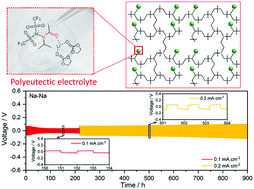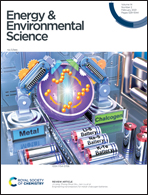Polyeutectic-based stable and effective electrolytes for high-performance energy storage systems†
Abstract
Solid polymer electrolyte (SPE) is a promising alternative to existing liquid electrolytes for next-generation solid-state alkali metal batteries for better safety and higher performance. However, the existing SPEs suffer from low ionic conductivity as well as limited chemistries that satisfy practical implementation. Here we report a new class of polyeutectic electrolyte (PEE) for high-performance energy storage applications. The interaction between alkali bis(trifluoromethanesulfonyl)imide (TFSI) salts (LiTFSI, NaTFSI and KTFSI) and N-isopropylacrylamide molecules (polymer precursor) was found to play an important role in both the formation of eutectic electrolyte and the subsequent polymerization process. The as-prepared PEE exhibited high ionic conductivity of 1.3 × 10−4 S cm−1 at room temperature and wide electrochemical window, enabling high capacity and excellent stability both in symmetrical cells and all-solid-state alkali metal batteries. Meanwhile, when serving as a separator in redox flow batteries, the modified separator displayed enhanced cell Coulombic efficiency (nearly 99.9%) compared with the commercial Celgard separator (ca. 95%). The results in this work showcase the effectiveness and versatility of PEE for high-performance electrical energy storage systems.

- This article is part of the themed collection: Energy & Environmental Science Recent HOT Articles


 Please wait while we load your content...
Please wait while we load your content...